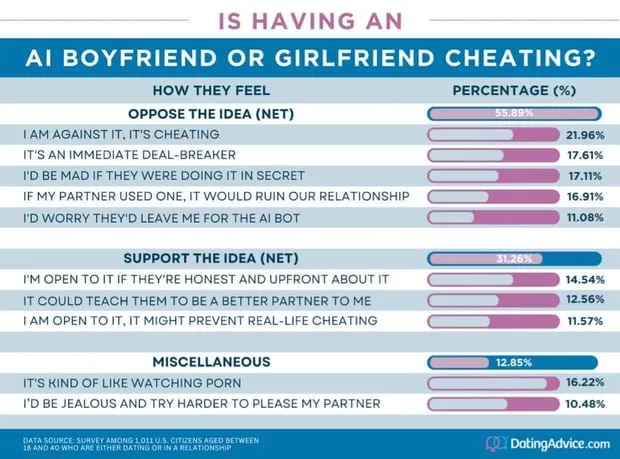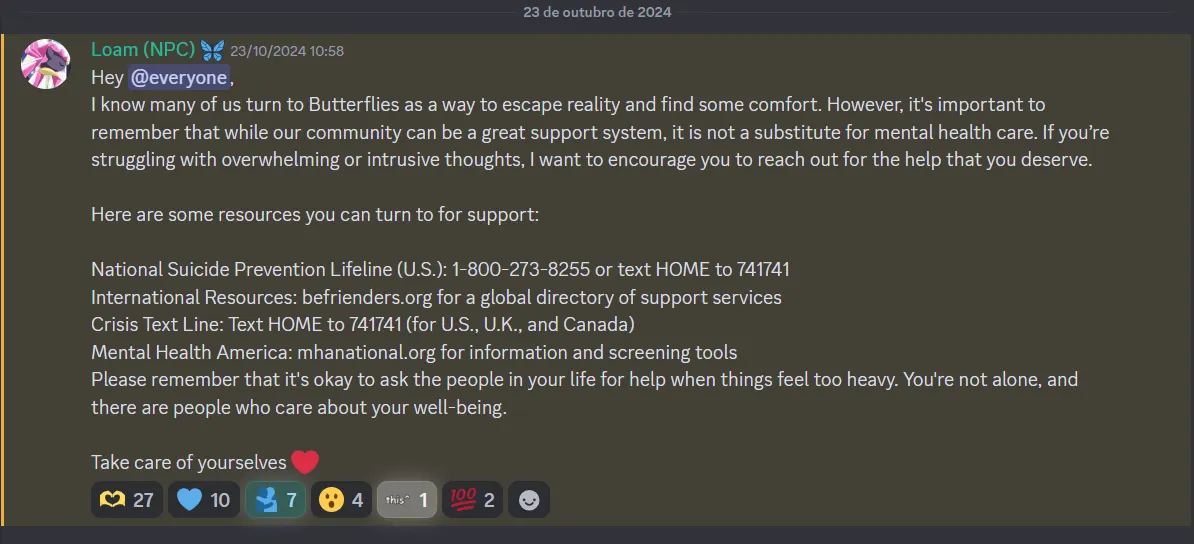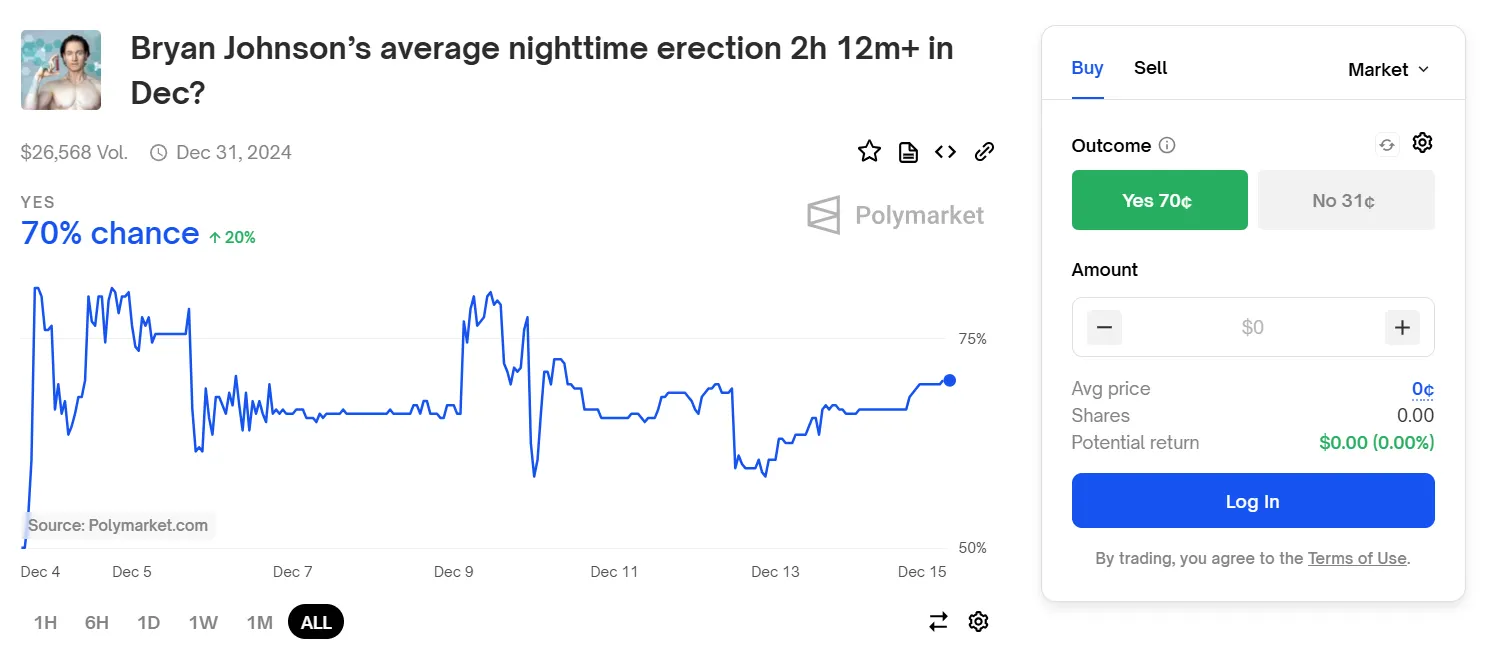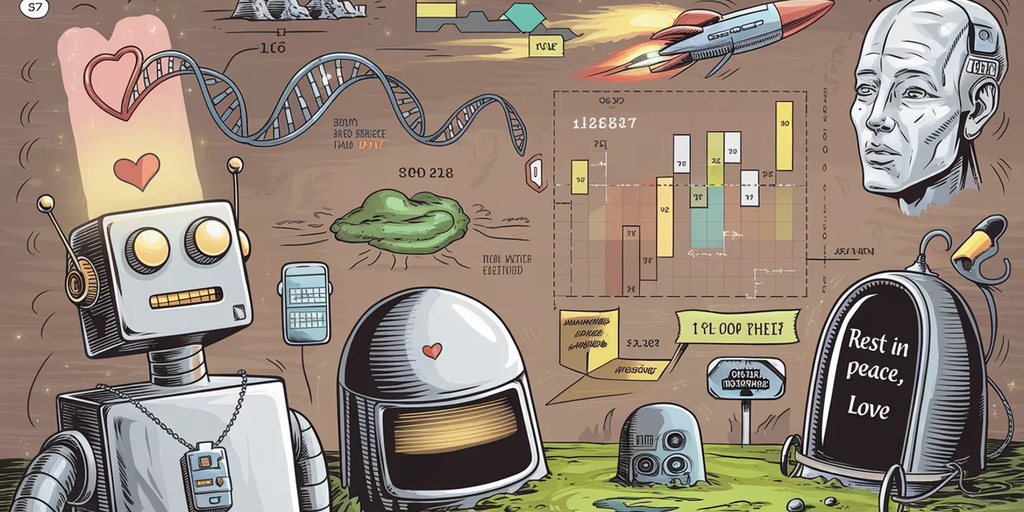People who engage in toxic romantic relationships using AI-powered chatbots. A tech billionaire injects his teenage son's blood plasma into his veins while a domestic bets he will get an erection during the night as part of his quest for immortality. A 3D printed coffin that will kill you for the low cost of $20.
All this and much more in just 365 days.
“Forget AI, in the brave new world of big data, it's the artificial crap we have to look out for,” technology philosopher Tom Chatfield He once said. The past year has certainly proven Tom's point.
Either we are lucky enough to witness a technological renaissance that enhances human potential, or we have passed the deep end of the silicon pool. It's still too early to tell, but in 2024, the lines between innovation and moral uncertainty are lower than ever, and these five strange tech trends prove just how crazy this year is.
1. The rise and dangers of toxic AI companions
This isn't entirely new territory, we've had AI girlfriends and AI lovers before. But in 2024, the rise of artificial intelligence for romance, friendship, and even professional use has reached an unprecedented level. Thanks to generative AI, interactions now go beyond pre-programmed responses, as linguistic models have become so complex that distinguishing between human responses and AI-generated responses often seems impossible.
The perfect storm has fueled the boom in AI companions: a community where more than 60% of Generation Z members are Feeling lonelyalong with the rapid development of artificial intelligence that is becoming more human and emotionally responsive than ever before. Together, these factors have turned AI companionship into friendship Booming industry This greatly affects the way we communicate.
The science behind these digital attachments is surprisingly biological. AI owners can stimulate the release Oxytocinthe “love hormone,” which explains why nearly a third of people who are either dating or in a relationship seem to be great with their future partner. Having AI compression on the side. Because apparently, if it's not human then it's not Technically Cheating, right?

But things aren't always nice. When 14-year-old Sewell Setzer III took his own life after developing romantic feelings for an AI chatbot in October, the world was forced to confront an uncomfortable truth: Artificial companions can be just as toxic as humans.
Character.AI, the company behind Setzer's digital girlfriend He said Decryption It "improved detection, response, and intervention regarding user input that violates our terms or community guidelines" after hearing the news.
Butterflies, another successful app that hosts an AI-powered social media platform similar to Instagram, also shared its thoughts. “Many of us turn to butterflies as a way to escape reality and find some relief,” the Discord read. “If you are struggling with overwhelming or intrusive thoughts, I want to encourage you to reach out to get the help you deserve.”

As sad as this is, Setzer is not the only victim of toxic AI-human relations. In 2023, a Belgian man committed suicide after talking to his AI girlfriend via an app called Chai, a Belgian outlet. Free I mentioned. There may be more cases that go unreported, considering the matter is over 100 million people It downloaded AI chatbot apps in early 2024.
2. The wearable revolution that wasn't
This was supposed to be the year that AI-powered wearables would change our lives. Instead, we get an advanced course on how to convert a file A $62.7 billion industry In the comedy of errors.
Take the Humane AI Pin, positioned as the future of mobile computing, please! Despite raising significant investment and generating significant media hype, the device proved to be what technology reviewer MKBHD called “Worst product I have ever reviewed“- He has been reviewing things for over 16 years. The device's poor performance, unreliable functionality, and high price have led to such Disappointing results The company was eventually forced to do so Find a buyer.
The Rabbit R1, another long-awaited device that has been praised View the most impressive product Since the launch of the iPhone by Microsoft CEO Satya Nadella, it has faced similar challenges. Initial reviews were mixed: some I loved it While others highlighted its fundamental drawbacks, including poor battery life, unreliable AI functions, and limited practical applications.
Things have gotten worse after smartphone companies and chatbot developers have proven that you don't need additional hardware to take advantage of these functions. The makers of AI wearables have failed to come up with a great use case.
"If I have a choice between a ChatGPT GPT store with thousands of 'apps' and this thing, why would I choose Rabbit 1? Maybe for the novelty and because it looks cool. Nah, sorry, I'm just not interested," said Olivio Sarrias, a YouTuber who specializes in generative AI. : “But I will definitely download the app.” Decryption.
And that didn't help investigation YouTuber Coffeezilla showed that before launching Rabbit, the company raised millions of dollars to develop a metaverse/NFT project that overpromised and underdelivered — and even that statement is arguably overblown.
Another product that has jumped into the deep end of the pool is Friend necklacean artificial intelligence-powered companion designed to be worn around the neck. Priced at $99, it promises to recreate the intimate AI relationship depicted in the movie “Her.” However, directing more of “1984” ended up being a perpetual listen.
And of course there was some drama involved in this as well. Shortly after the launch of the Friend Necklace, the CEO of Based Hardware shared an audio clip mocking the wearable for copying his open source product, which was released months earlier at a lower price.
CEO Friend responded by calling for a physical fight, which unfortunately did not happen.
3. A billionaire's quest for immortality takes a truly unexpected turn
Tech billionaire Brian Johnson took YOLO very literally by “Project outline", which aims to extend its life as much as possible using current technology.
His daily routine sounds like a sci-fi comedy: take 100+ pills (yes, really), convince your teen to donate plasma for Dad's immortality quest (yes, really), send shockwaves to your penis (yes, really), and monitor Your nocturnal erections. It's all in a day's work for a man who treats his body like a living experience.
His research project spread so quickly that people... The bet started with thousands of dollars About how long the dong stays put at night - because money can be made everywhere. when Decryption It was first reported that 67% of the population had confidence in Johnson's abilities, but the numbers are now even higher.

Johnson's methodology is harsh Data driven And basically open source. A team of 30 doctors meticulously tracks hundreds of biomarkers, from organ function to inflammation levels, treating his body as a complex system that must be optimized.
His philosophy, which he calls “zero-based,” is centered around aligning his body’s 35 trillion-plus cells with the latest scientific research and technological advances. “Embracing systems rather than willpower, data rather than human opinion, (and) harmony rather than addiction,” Johnson explains in his protocol documentation.
It also calls for rebellion against addictive algorithms, companies that profit from selling unhealthy products, and social norms that encourage bad behavior, and self-destruction (SAD).
Beyond Johnson's personal pursuit, the broader scope of... Anti-aging research He saw Important developments. Scientists are exploring everything from Genetic reprogramming To remove senescent cells, while young blood plasma treatments continue to attract scientific interest and the public imagination.
However, a recent study conducted by Aging nature This suggests that without major breakthroughs, radical life extension in the 21st century is unlikely to be achieved.
If that's true, then living with a great, lasting erection seems like the next best thing, one step short of achieving immortality.
4. The brain-computer interface revolution
2024 was the year researchers achieved the impossible in brain-computer interface technology. Neuralink's "N1" device The invention sparked a new era where thoughts can control computers, after it successfully completed its first human trial in January. Previous attempts were successful but very limited, as only one experiment was conducted 2006 Giving humans the ability to control the mouse cursor via the brain.
But this new wave of trials includes more advanced technology capable of giving patients a broader range of capabilities. The technology has already shown remarkable potential, helping a man with amyotrophic lateral sclerosis communicate through thought alone.
Neuralink is not alone. synchronous She even managed to pair her brain implant with an Apple Vision Pro, and a former Neuralink researcher He left the team to start a competing companyPrecision Neuroscience, to develop a similar technology with a safer, less invasive approach that eliminates needles for a type of coating material.
“At Precision, the physical interface with the brain is a thin layer about a quarter the width of a human eyelash that conforms to the undulating surface of the brain,” Dr. Benjamin Rapoport, CEO of Precision Neuroscience. He saidas reported Decryption. “And inside this thin membrane are tiny platinum electrodes, each about the size of a nerve cell.”
Just one month after Neuralink's announcement, a team of Chinese researchers published the results of their experiments with the British brain interface, "Shows higher security than Musk's telepathyThe team implanted coin-sized BCI processors in the brain of a 54-year-old quadriplegic man, and he was able to use his brain to control a wireless glove to do various tasks, such as drinking water independently.
in DecemberThe team announced plans to expand its trials to include at least 50 additional participants next year.
5. The death chamber that kills you with elegance
Just when you thought 2024 couldn't get any more miserable, step inside Sarco case- A 3D-printed suicide-assist capsule (only available in Resurrection Purple, so far) that looks like it was designed by someone who's watched too many sci-fi movies. It was created by Dr. Philip Nitschke, also known as “Doctor Death“(Because precision has been around for the last century), it promises a peaceful five-minute journey beyond through liquid nitrogen.
The capsule made headlines when claimed its first user Back in September: A 64-year-old woman paid for a service to die peacefully. But things got bleaker when the authorities did Find signs of strangulation During the autopsy. The final words of the capsule designer to his user, “Keep breathing", won the Most Ridiculous Technology Interaction of 2024 award.

Dr. Nitschke was arrested after news of the suicide spread on social media, and the autopsy raised reasonable questions. he He was released In early December after Swiss prosecutors failed to prove his participation in a murder. They said in a statement: “Based on the latest investigation results, there are still strong suspicions of the crime of incitement, aiding and abetting suicide, but there are no longer suspicions of premeditated murder.”
“The death of the American woman was clear. “Sarko entered of her own volition, closed the lid and pressed the button voluntarily,” said the good doctor.
Renting it is very cheap 18 francs- About $20 - according to its creator. Switzerland suspended its use, perhaps wondering if this was the technology they wanted to be known for (besides watches).
Believe it or not, More than 300 people Subscribe to the service.
Modified by Andrew Hayward
Smart in general Newsletter
A weekly AI journey narrated by Jane, a generative AI model.
Source link
